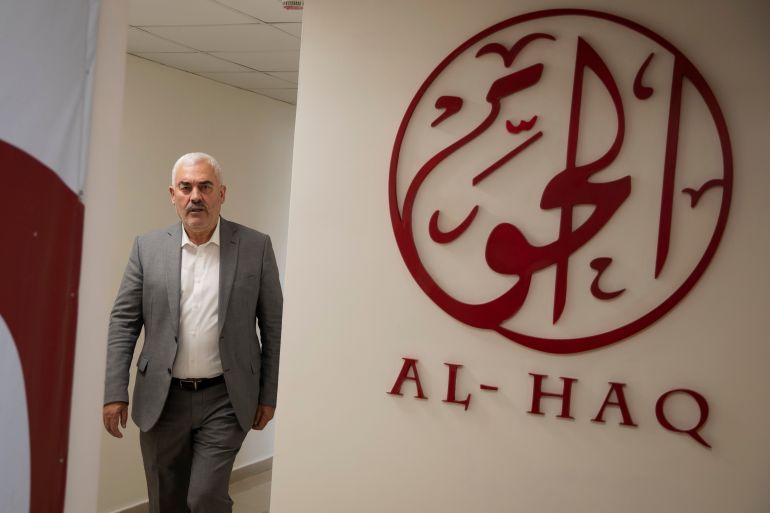‘Unfounded allegations’: EU resumes funding of Palestinian NGOs
The European Commission suspended funding for two Palestinian rights groups last year amid Israeli ‘terror’ claims.

Ramallah, Occupied West Bank – The European Union (EU) has told two prominent Palestinian NGOs that it will resume funding them after a yearlong suspension tied to unfounded “terror” allegations made by Israel.
The European Commission – the EU’s executive branch – sent letters several days ago to Al-Haq and the Palestinian Center for Human Rights (PCHR), informing them that their 13-month-long suspensions were lifted unconditionally and with immediate effect.
Keep reading
list of 3 itemsOutcry as Israel labels Palestinian rights groups ‘terrorists’
Why is Israel labelling Palestinian rights groups ‘terrorists’?
The Commission cited the results of a review conducted by the EU’s European Anti-Fraud Office (OLAF), which it said found “no suspicions of irregularities and/or fraud” and “did not find sufficient ground to open an investigation”.
According to information provided to Al Jazeera, the emails were sent soon after Al-Haq had launched legal proceedings against the Commission.
Al-Haq said in a statement on Thursday that more than 13 months after an arbitrary suspension was imposed on the funding of Al-Haq’s EU-funded project, the Commission had “finally lifted this disgraceful suspension, which was unlawful from the start and based on Israeli propaganda and disinformation”.
“The suspension has been lifted unconditionally and with immediate effect,” Al-Haq said.
“For decades, Al-Haq has been working on protecting the rights of the Palestinian people against international law violations committed by Israel and other perpetrators. The suspension amounts to another violation. We will continue promoting accountability and upholding the rule of law,” the organisation added.
“In our interaction with the Commission, we have requested assurances regarding the Commission’s commitment to execute the remainder of the project in good faith, ruling out any further politically-motivated disruptions based on slanderous allegations against Al-Haq.”
The EU suspended its funding to Al-Haq and PCHR in May 2021.
That month, European diplomats had received a classified Israeli intelligence dossier alleging that six prominent Palestine-based NGOs, including Al-Haq, were using EU money to fund the Popular Front for the Liberation of Palestine (PFLP).
The Commission suspended its funding for the PCHR at the same time despite it not being one of the six NGOs mentioned.
A few months later, in October 2021, Israel outlawed the six organisations, under the pretext of affiliation with the PFLP political party, the armed wing of which was once active during the second Intifada in the early 2000s and carried out attacks against Israeli targets.
The designation was widely condemned by the international community and rights groups as “unjustified” and “baseless”.
No evidence was provided by the Israeli government to substantiate its claims surrounding the six organisations.
The United Nations High Commissioner for Human Rights, Michelle Bachelet, described the decision as an “attack on human rights defenders, on freedoms of association, opinion and expression and on the right to public participation” and said it “should be immediately revoked”.
Court hearing
Following efforts by Al-Haq to inquire about the legal nature of the suspension, the group launched legal proceedings against the Commission in Brussels.
The first court hearing has been scheduled for July 4, 2022.
Al-Haq informed Al Jazeera that despite the lifting of the suspension, the organisation will continue with the legal proceedings, for reputational damage and assurances of good faith in the future.
“The fact that [Al-Haq] has been suspected of financing terrorism for over a year on the basis of information that has no factual basis, is in itself damaging to its reputation,” the subpoena reads, adding that the EU “breached its contractual obligations”.
Al-Haq’s Director Shawan Jabarin said on Thursday that he never had any doubt that the Commission would lift the suspension.
“We knew that the suspension, like the designation by Israel of Al-Haq and other Palestinian civil society organizations, had no legal and factual grounds,” Jabarin said in a statement.
“The voice of reason and logic has prevailed after a long delay. We are glad to see the Commission retracting its harmful decisions and moving back in the right direction of supporting civil society and human rights,” Jabarin said.
“We are concerned that the suspension may have been intentional, in order to harm our reputation and standing. Nevertheless, our legitimate work of documenting human rights violations, public and political advocacy and the promotion of accountability will continue,” he said.
“We consider the lifting of the suspension a victory for Al-Haq and Palestinian civil society at large, in our ongoing efforts of defending international law and human rights and holding the perpetrators of grave violations accountable.”
Civil society organisations, which obtain most of their funding from donor states, are a key pillar in the social and economic development of Palestinians living in territories occupied since 1967.
NGOs based in Palestine or working for Palestinian rights have long been the targets of smear, defamation, and defunding campaigns by Israeli and international lobby groups such as NGO Monitor and UK Lawyers for Israel, in cooperation with the Israeli government, with which they have close ties.
Since 1967, Israel has banned (PDF) more than 400 local and international organisations as being “hostile” or “unlawful”, including all major Palestinian political parties, such as the Palestinian Authority’s governing Fatah party, and the Palestine Liberation Organization (PLO), with which Israel signed the 1993 Oslo Accords.
The designation “authorises Israeli authorities to close their offices, seize their assets and arrest and jail their staff members, and it prohibits funding or even publicly expressing support for their activities”, according to an October 2021 statement by rights groups Human Rights Watch and Amnesty International.